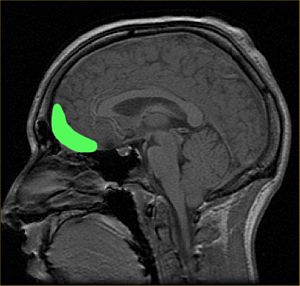Psychopathy facts for kids
Psychopathy is a type of personality disorder. This means it's a way of thinking, feeling, and behaving that is different from what most people expect. People with psychopathy often seem to lack strong emotions. They might not care about the feelings or rights of others.
They usually don't show much empathy, which is the ability to understand and share the feelings of another person. They also might not follow social norms, which are the unwritten rules of how people should behave. People with psychopathy often don't have a strong conscience and don't feel guilt when they do something wrong. A similar word sometimes used is sociopathy.
Many people with psychopathy can be very charming at first. They might form friendships that seem normal, but these are often not very deep. They might use other people to get what they want. People with psychopathy often act in ways that go against what society expects. They can be very selfish and might stop caring about people once they are no longer useful to them.
Thanks to modern brain scans like MRI, scientists can now see differences in the brains of people with psychopathy. These differences are found in areas of the brain that control emotions, how we interact with others, our sense of right and wrong, and how we control our actions.
Some scientists think that certain body chemicals might play a role in psychopathy. For example, high levels of testosterone (a hormone) combined with low levels of cortisol or serotonin (other chemicals in the body) have been suggested as possible factors.
The exact definition of psychopathy has changed over time. Different experts might use slightly different ways to describe it.
Sometimes, doctors try to help people with psychopathy using behaviour therapy. This often happens in prisons, as some people with psychopathy might end up there.
It's important to know that some people are wrongly called psychopaths. These people might be very good at influencing others, but they don't have problems following social rules. Psychopathy can also look different in men and women. In men, it often shows up as more antisocial behavior. In women, it might appear more as a histrionic pattern, which means seeking a lot of attention.
Many professional psychiatrists agree that psychopathy is very hard to treat.
What are the main features of psychopathy?
Experts don't always agree on every single feature of psychopathy. However, some characteristics are almost always considered important.
- Arrogant and deceitful behavior: People with psychopathy might try to make a good impression or seem charming. They often have a very high opinion of themselves and might lie a lot. They can also be very good at manipulating others to get what they want.
- Lack of normal feelings: They often don't feel regret or guilt. Their emotions might seem shallow or cold, and they can lack empathy. They also often don't take responsibility for their own actions.
- Impulsive and irresponsible life: They might act without thinking and enjoy taking risks. They can be unreliable and might depend on others financially. They also often struggle to set and reach long-term goals.
How is psychopathy diagnosed?
Psychopathy is most often checked using a special tool called the Psychopathy Checklist, Revised (PCL-R). This checklist was created by a researcher named Robert D. Hare. The PCL-R is widely used and is seen by many as the best way to assess psychopathy.
See also
 In Spanish: Psicopatía para niños
In Spanish: Psicopatía para niños


